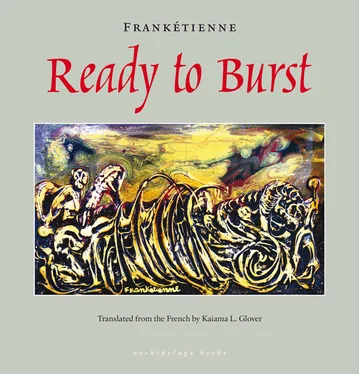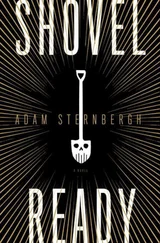Franketienne - Ready to Burst
Здесь есть возможность читать онлайн «Franketienne - Ready to Burst» весь текст электронной книги совершенно бесплатно (целиком полную версию без сокращений). В некоторых случаях можно слушать аудио, скачать через торрент в формате fb2 и присутствует краткое содержание. Год выпуска: 2014, Издательство: Archipelago, Жанр: Современная проза, на английском языке. Описание произведения, (предисловие) а так же отзывы посетителей доступны на портале библиотеки ЛибКат.
- Название:Ready to Burst
- Автор:
- Издательство:Archipelago
- Жанр:
- Год:2014
- ISBN:нет данных
- Рейтинг книги:3 / 5. Голосов: 1
-
Избранное:Добавить в избранное
- Отзывы:
-
Ваша оценка:
- 60
- 1
- 2
- 3
- 4
- 5
Ready to Burst: краткое содержание, описание и аннотация
Предлагаем к чтению аннотацию, описание, краткое содержание или предисловие (зависит от того, что написал сам автор книги «Ready to Burst»). Если вы не нашли необходимую информацию о книге — напишите в комментариях, мы постараемся отыскать её.
Ready to Burst
The New York Times
Ready to Burst — читать онлайн бесплатно полную книгу (весь текст) целиком
Ниже представлен текст книги, разбитый по страницам. Система сохранения места последней прочитанной страницы, позволяет с удобством читать онлайн бесплатно книгу «Ready to Burst», без необходимости каждый раз заново искать на чём Вы остановились. Поставьте закладку, и сможете в любой момент перейти на страницу, на которой закончили чтение.
Интервал:
Закладка:
— Raynand, tell us what you think of your friend Paulin’s ideas. Why don’t you say a thing or two on the subject …
Raynand carefully fills his glass to the brim, takes his time emptying it, then responds calmly.
— To be afraid of marriage is a form of cowardice. I’m not denying the difficulty of domestic life, with a wife and kids, not one bit. On the contrary … But I see, despite that, important reasons to fight for such things. The life of a family man is made up of everyday heroism. Who doesn’t recognize the valor it takes for a man to feed his children, to clothe them, to watch over his companion, to concern himself with her happiness, to give meaning to her life?
— Exactly, responds Paulin confidently. That’s what I fear the most. Under no circumstances would I want to exhaust my own strength in fruitless battles. Not to mention all the petty conjugal disputes. A bit of warfare between lovers, as Sartre might say. There are so many problems to solve that I wouldn’t want to dissipate my reserves of energy — out of affective lack or unforgivable weakness — on a woman who wouldn’t understand my sacrifices. I loathe wastefulness. Moreover, as I’ve made clear here, in the best of circumstances, marriage consecrates the triumph of selfishness in the illusory happiness of a closed circle. Removed from others and their suffering.
— You’re a cynic, Paulin. The selfish one is you, who refuses to share your life, retorts Raynand angrily. Yes, you’re the selfish one. You’re afraid. Because you’re not sure of yourself.
— Well, who isn’t afraid? Who is sure of himself? Please, introduce me to this heroic being, this rare species of animal.
— I still love Solange. I’d marry her in a second, if she wanted that.
— Go after her, then. Marry her. Share your life with her. That’s all up to you, if you’re so sure of yourself.
— As far as this is concerned, Paulin, we’ll never agree. We don’t have the same history. Our experiences are different.
— Do you really want to brag about that, dear man? responds Paulin ironically.
Nonchalantly, Raynand rises from his seat. He downs another shot. Clasps his friends’ hands. Gives Paulin’s shoulder a friendly slap.
— All right, Paulin. I’m headed out. I’ll come by your place tomorrow afternoon. I’ll be there for sure.
— Okay, I’ll be waiting for you. I hardly ever go out. I write. I’m preparing a great work.
Raynand goes out into the sun as it tips its fiery boiler into the bay. Above the din of the Croix-des-Bossales market, sailboats rest at anchor in the harbor. Butterflies perched on an immense gray platform. Ah, the silvery mirror that is the blue sea of the islands on a summer afternoon.

— How many times did you tell me you’d come back! Every day I watch the trees gather up their shadowy skirts, propped up on their crooked legs. Every night I’ve counted the hours till the cock’s crow, till the stridulations of the crickets. But you never came back, Jastrame .
She lowered the flame of the lamp and lit a candle that she’d affixed using a bit of wax melted on the little oak table. She undid the white handkerchief that held back her long hair, the color of cane syrup. Stretched out on a mat woven out of dried leaves from the trunk of a banana tree, I pretended to sleep. She couldn’t know that I’d heard her, that I’d been watching her. Enlarged, deformed against the earthen wall, her shadow offered a pitifully disheveled image of unrequited love. She uncorked a flat bottle, spilled three healthy measures of spirits at the foot of her bed .
— You never came back, Jastrame. Can it be that you’ve abandoned me for the rest of my days? Lord, why have you burdened me with this test too great for my strength and my morale? I suffered so much during my youth that I thought misery would have been forever banished from my existence. Lord Jesus! Mother Mary, my mistress! Why leave yet another vulnerable place in my brutalized heart?
Head bowed, she begins to weep. Until she’s been worn out. Exhausted. To my eyes she’d become the very picture of suffering — weeping, naked, slumped on the armrest of the night. I stopped watching her. And I began to cry under my sheet. I cried all night long .
Grandmother, seventy years old at the time, never again saw Jastrame, her lover, her companion in old age. Alone in an impoverished province, cut off from her people, only seeing her grandson during the summer months, she died of despair. When we learned of her death, by telegram, the entire household burst into tears. During the two days spent in funeral preparations, I stayed clear of all the others, with their yapping like rabid dogs … Their cries bothered me. I didn’t shed a single tear. They called me cynical, an ungrateful little beast incapable of affection. I didn’t defend myself at all. I alone knew how much Grandmother had suffered in her solitude, because I had cried alongside her, without her knowing it, at the very moment where she needed — more than ever — to hear a human voice. Abandoned in her provincial hole, she’d spent her final days awaiting a touch, a word, a smile, a cry. Hoping for someone, a Jastrame, anyone. She died with only love’s painful shadow to keep her company, tragic portrait of solitude projected on an earthen wall. That, I alone knew .
The day of her funeral, the truck in which we were riding swerved suddenly and flipped over near “Smelly Springs.” Although no one was hurt, the accident itself upset me greatly. And I was even more horrified by the fact that my Grandmother would end up buried in a cracked coffin. Only eight years old, I’d already been made aware of life’s cruel workings. With all its problems. Its surprises. Its complications. I knew that something didn’t work correctly. I couldn’t accept the fact that misery had been long nipping at the heels of a poor peasant woman, and had ruthlessly pursued her to her very grave .
Now that I have so much better understood Grandmother, I wonder if I’m not the only one in the family to keep an inheritance of torments and worries buried deep inside. In my body, sealed-in pain. In my heart infused with the tears of a night when love pitifully projected its lonely and fateful shadow on an earthen wall. Like Grandmother, I’m waiting for someone. Anyone. A touch. A human voice. A face. A Jastrame. I’m waiting to no longer be alone .

Three in the afternoon. Raynand is at Paulin’s house, in his bedroom. He’s clearly surprised by the atmosphere of silence and order that suffuses the little gray room. He’s impressed. So astonished that he can hardly speak. He doesn’t know where to begin. Not in a million years would he have imagined such discipline from someone as noisy and explosive as Paulin. He glances quickly at the shelves of the bookcase before sitting down. A bunch of marked-up manuscript pages have been arranged on a metal table.
— Are you the one who wrote all of that, Paulin?
— I’ve been working on a novel for the past few months. It’s been tormenting me mercilessly, beating me like a draft horse. I’ve been carrying a heavy load ever since I took on this project.
— You say you’ve been working on it for months now?
— This could even take years, my dear Raynand.
— I’ve heard that the novel is a difficult genre.
— Yes, in a sense, rather difficult. Especially when it comes to breaking with tradition. To renewing something. To creating. Literature is beginning to grow old. And having arrived at this state of decrepitude, it risks being dethroned by cinema, which, conversely, shows brand-new vigor. Making use of the scientific technologies of the twentieth century, and using the resources of other branches of the arts as helpful tools, cinema has achieved almost a miracle: it has raised itself to the level of a total art form. The threat it poses to literature is enormous. Certain. Yet it isn’t a question of doing battle, or of eradicating it. That would be a waste of time. Literature is dying. It will die, without question. Not even the most seasoned doctors can save it. Its tissues, its arteries are sclerotic. And its heart, having turned into rusty metal, feebly pumps out rotten blood.
Читать дальшеИнтервал:
Закладка:
Похожие книги на «Ready to Burst»
Представляем Вашему вниманию похожие книги на «Ready to Burst» списком для выбора. Мы отобрали схожую по названию и смыслу литературу в надежде предоставить читателям больше вариантов отыскать новые, интересные, ещё непрочитанные произведения.
Обсуждение, отзывы о книге «Ready to Burst» и просто собственные мнения читателей. Оставьте ваши комментарии, напишите, что Вы думаете о произведении, его смысле или главных героях. Укажите что конкретно понравилось, а что нет, и почему Вы так считаете.





![Эрнест Клайн - Ready Player Two [calibre]](/books/438636/ernest-klajn-ready-player-two-calibre-thumb.webp)






